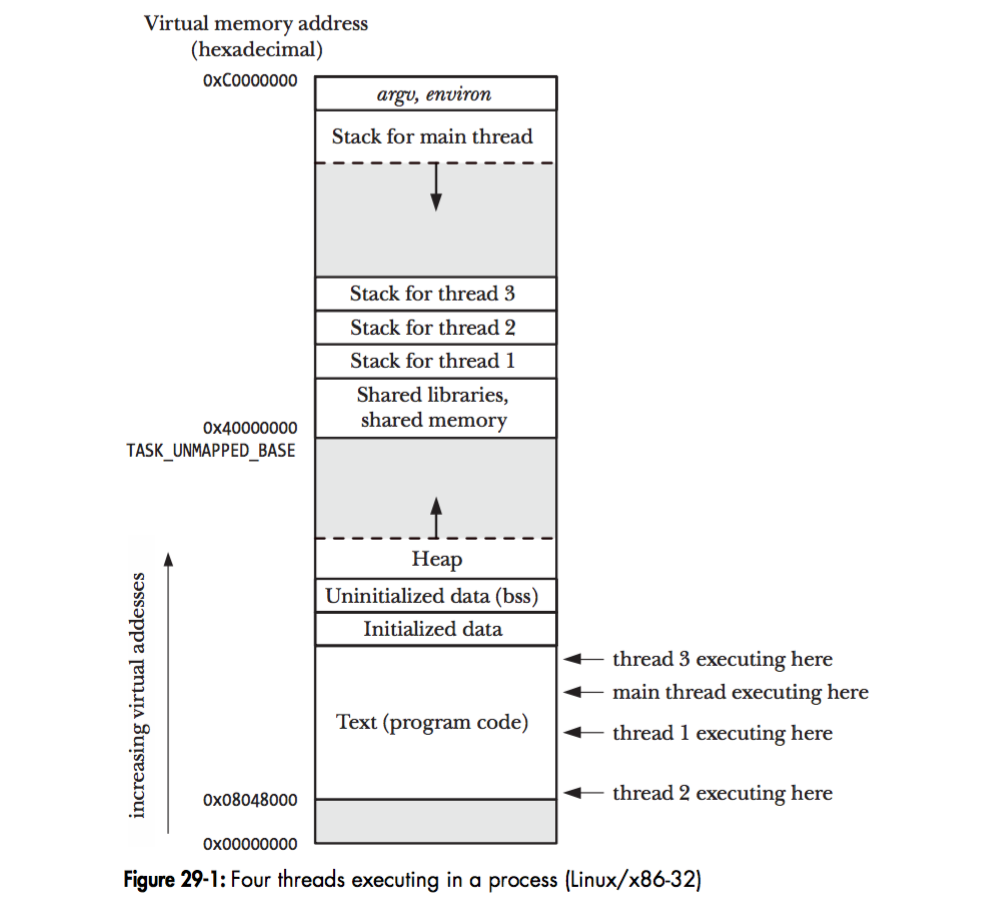What follows is an example code which you can use to check how the threads of a multi-thread application share their memory. However, you need to add
extra code to check whether the threads of a multi-thread application share their heap areas. The heap area of a thread is created by malloc() and
released by free().
#include <stdio.h>
#include <pthread.h>
#include <string.h>
#include <sys/syscall.h> /* Definition of SYS_* constants */
#include <unistd.h>
extern void *func1(void *);
extern void *func2(void *);
extern int main();
//void * my_get_physical_addresses(void *);
struct data_
{
int id ;
char name[16] ;
} ;
typedef struct data_ sdata ;
static __thread sdata tx ; //thread local variable
int a=123; //global variable
void hello(int pid)
{
int b=10; //local varialbe
b=b+pid;
//global variable
printf("In thread %d \nthe value of gloable varialbe a is %d, the offset of the logical address of a is %p, ", pid, a, &a);
printf("the physical address of global variable a is %p\n", my_get_physical_addresses(&a) );
//local variable
printf("the value of local varialbe b is %d, the offset of the logical address of b is %p, ", b, &b);
printf("the physical address of local variable b is %p\n", my_get_physical_addresses(&b));
//thread local variable
printf("the offset of the logical address of thread local varialbe tx is %p, ", &tx);
printf("the physical address of thread local variable tx is %p\n", my_get_physical_addresses(&tx));
//function
printf("the offset of the logical address of function hello is %p, ", hello);
printf("the physical address of function hello is %p\n", my_get_physical_addresses(hello));
printf("the offset of the logical address of function func1 is %p, ", func1);
printf("the physical address of function func1 is %p\n", my_get_physical_addresses(func1));
printf("the offset of the logical address of function func2 is %p, ", func2);
printf("the physical address of function func2 is %p\n", my_get_physical_addresses(func2));
printf("the offset of the logical address of function main is %p, ", main);
printf("the physical address of function main is %p\n", my_get_physical_addresses(main));
//library function
printf("the offset of the logical address of library function printf is %p, ", printf);
printf("the physical address of library function printf is %p\n", my_get_physical_addresses(printf));
printf("====================================================================================================================\n");
}
void *func1(void *arg)
{
char *p = (char*) arg ;
int pid ;
pid = syscall( __NR_gettid );
tx.id = pid ;
strcpy(tx.name,p) ;
printf("I am thread with ID %d executing func1().\n",pid);
hello(pid);
while(1)
{
//printf("(%d)(%s)\n",tx.id,tx.name) ;
sleep(1) ;
}
}
void *func2(void *arg)
{
char *p = (char*) arg ;
int pid ;
pid = syscall( __NR_gettid );
tx.id = pid ;
strcpy(tx.name,p) ;
printf("I am thread with ID %d executing func2().\n",pid);
hello(pid);
while(1)
{
//printf("(%d)(%s)\n",tx.id,tx.name) ;
sleep(2) ;
}
}
int main()
{
pthread_t id[2];
char p[2][16] ;
strcpy(p[0],"Thread1") ;
pthread_create(&id[0],NULL,func1,(void *)p[0]);
strcpy(p[1],"Thread2") ;
pthread_create(&id[1],NULL,func2,(void *)p[1] );
int pid ;
pid = syscall( __NR_gettid );
tx.id = pid ;
strcpy(tx.name,"MAIN") ;
printf("I am main thread with ID %d.\n", pid);
hello(pid);
while(1)
{
//printf("(%d)(%s)\n",tx.id,tx.name) ;
sleep(5) ;
}
}

 The due day of report submission is
23:55 27th Nov.
The due day of report submission is
23:55 27th Nov.
 The demo will be held from 28th Nov.
to 1st Dec.
The demo will be held from 28th Nov.
to 1st Dec.
 Please fill out this
form to choose
your demo time
before 26th Nov.
Please fill out this
form to choose
your demo time
before 26th Nov.